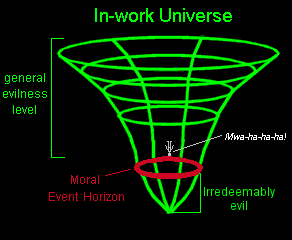Moral Event Horizon

"Tarkin, if ever there was a shred of humanity in you or these twisted creatures of yours, it's dead now. You're at war with life itself. You are enemies of the universe...your Empire is doomed."—Princess Leia Organa, from the Star Wars radio drama, after Grand Moff Tarkin wipes out her home planet.
Named for the boundary around a black hole from which there is no escape once crossed, this trope uses the black hole as a metaphor for evil; the Moral Event Horizon refers to the first evil deed to prove a particular character to be irredeemably evil.
Note the word irredeemably. It is a demonstration of permanent evil; as in, the first evil deed whose role in the story is to tell us they will always be evil.
While they may not have had a term such as this to define it, many authors clearly recognized it. Robert A. Heinlein's Stranger in A Strange Land referred to it as being the result of an act that was "so bad, so black" that it was basically unforgivable. Hank Rearden in Ayn Rand's Atlas Shrugged said that "to convict a human being of that practice was a verdict of irrevocable damnation... a verdict of total evil" and that "he would not believe it of anyone, so long as the possibility of a doubt remained." Meanwhile, Multiple religions have the concept of "perdition", where those who have committed a truly unpardonable sin are irrevocably doomed to damnation.
Obviously, it follows from the definition that a character can't cross this boundary more than once. Crossing it implies going from redeemable to irredeemable, and that's it; the other way around contradicts the definition. Note that this does not mean their morality is always decreasing after crossing this; a character can cross this, then become much more horrible than they were when they crossed it, then become just a little better than they were after that, but they will never, ever commit an act that redeems them entirely.
Sometimes all that stands between man and monster is a Single Tear... or even a full-out weep. Perhaps a show of respect for the enemy. A Heel Realisation that you've gone too far is possible just as you're teetering on the edge of becoming a monstrosity - you've committed the act but you regret it. Characters who regret the act that would otherwise make them cross the line effectively become The Atoner. Just as with a real black hole, the closer you come to a Moral Event Horizon, the harder you must try to escape.
Can lead to a Complete Monster, but crossing the Moral Event Horizon does not automatically imply a Complete Monster. The character can just be a bad person; the Moral Event Horizon is a black mark in their history that cannot be forgiven.
A character whom performs an act that should make them irredeemable but somehow gets away with it is a Karma Houdini.
No real life examples, please; Calling Real Life people evil is an extremely bad idea.
Compare with
- Slowly Slipping Into Evil: The approach to the Moral Event Horizon.
- Jumping Off the Slippery Slope: A character skips over several progressively darker shades of gray and goes straight to the Moral Event Horizon.
- This Is Unforgivable!: An in-universe acknowledgment that the Moral Event Horizon has been crossed.
Contrast with
- What Do You Mean It's Not Heinous?
- Easily Forgiven: Sometimes, acts that really should be unforgivable are shrugged off in-universe.
- Adopt the Dog / Pet the Dog: An action by a morally neutral or ambiguous character that is meant to elicit audience sympathy for the character.
- Poke the Poodle: A half-assed attempt at villainy.
- Like a God to Me: Nearly the opposite of this trope. A character has done something so awesome that other characters fall over themselves to praise her/him.
- Animated Film
- Animated Films
- Anime and Manga
- Comic Books
- Fan Works
- Film
- Literature
- Live Action TV
- Music
- Oral Tradition
- Religion
- Tabletop Games
- Theatre
- Video Games
- Web Animation
- Web Comics
- Web Original
- Western Animation